Chapter 1|| Chapter 2 || Chapter 3 || Chapter 4|| Chapter 5 || Chapter 6 || Chapter 7 || Chapter 8 || Chapter 9 || Chapter 10 || Chapter 11 || Chapter 12 || Chapter 13 || Chapter 14 || Chapter 15 || Chapter 16 || Chapter 17 || Chapter 18 ||
Shrimad Bhagwad Gita – Chapter – 1 (Complete)
Chapter – 1 – Shloka -1
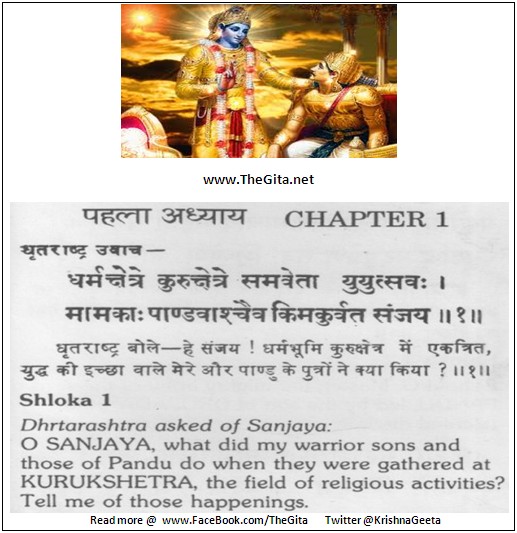
Dhrtarashtra asked of Sanjaya:
O SANJAYA, what did my warrior sons and those of Pandu do when they were gathered at KURUKSHETRA, the field of religious activities?Tell me of those happenings.
धृतराष्ट्र बोले —– हे संजय ! धर्मभूमि कुरुक्षेत्र में एकत्रित, युद्ध की इच्छा वाले मेरे पाण्डु के पुत्रों ने क्या किया ? ।। १ ।।
Chapter – 1 Shloka – 2
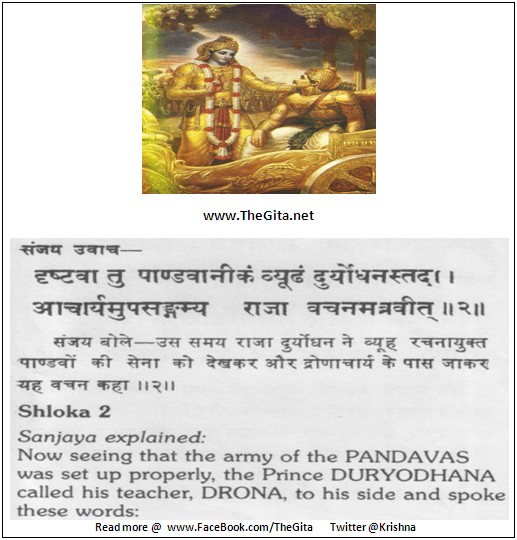
Sanjaya explained:
Now seeing that the army of the PANDAVAS was set up properly, the Price DURYODHANA called his teacher, DRONA, to his side and spoke these words:
संजय बोले —– उस समय राजा दुर्योधन ने व्यूह रचनायुक्त्त पाण्डवों की सेना को देखकर और द्रोणाचार्य के पास जाकर यह वचन कहा ।। २ ।।
Chapter – 1 Shloka – 3
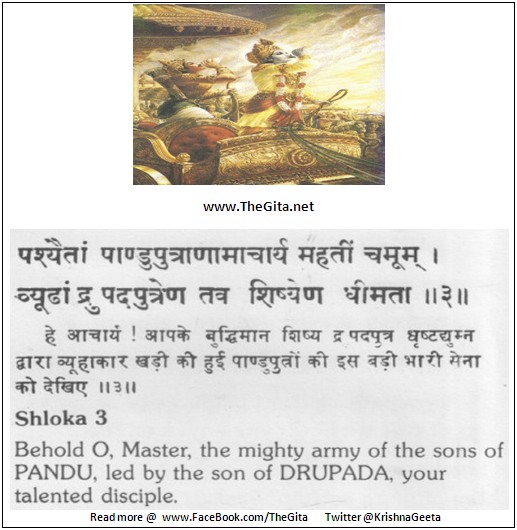
Behold O, Master, the mighty army of the sons of PANDU, led by the son of DRUPADA, your talented disciple.
हे आचार्य ! आपके बुद्भिमान शिष्य द्रु पदपुत्र धृष्टधुम्न द्वारा व्यूहाकार खड़ी की हुई पाण्डुपुत्रों की इस बड़ी भारी सेना को देखिए ।। ३ ।।
Chapter – 1 – Shloka – 4,5,6
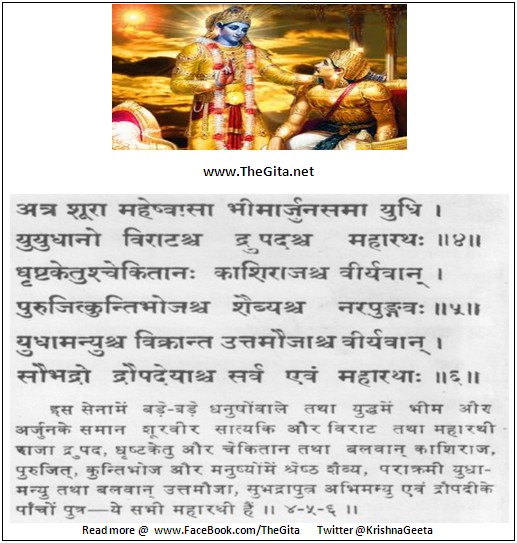
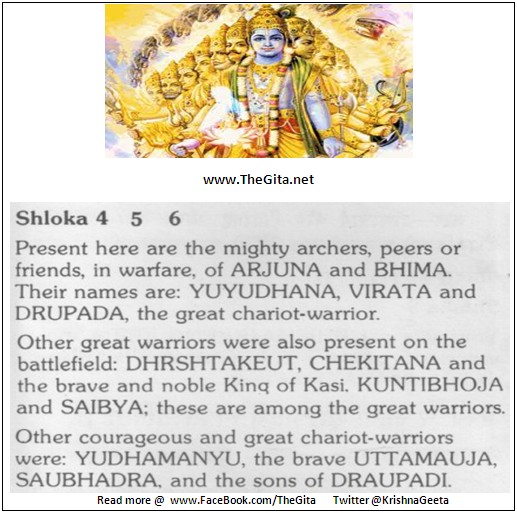
Present here are the mighty archers, peers or friends, in warfare, of ARJUNA and BHIMA. Their names are: YUYUDHANA, VIRATA and DRUPADA, the great chariot-warrior.
Other great warriors were also present on the battlefield: DHRSHTAKEUT, CHEKITANA and the brave and noble King of Kasi, KUNTIBHIJA and SAIBYA; these are among the great warriors.
Other courageous and great chariot-warriors were: YUDHAMANYU, the brave UTTAMAUJA, SAUBHADRA, and the sons of DRAUPADI.
इस सेना में बड़े-बड़े धनुषोंवाले तथा युद्ध में भीम और अर्जुन के समान शूरवीर सात्यकि और विराट तथा महारथी राजा द्रु पद धृष्टकेतु और चेकितान तथा बलवान् काशिराज, पुरुजित् कुन्तिभोज और मनुष्यों में श्रेष्ठ शैव्य, पराक्रमी युधामन्यु तथा बलवान् उत्तमौजा, सुभद्रापुत्र अभिमन्यु एवं द्रौपदी के पांचों पुत्र —– ये सभी महारथी हैं ।। ४ – ५ – ६ ।।
Chapter – 1 – Shloka – 7
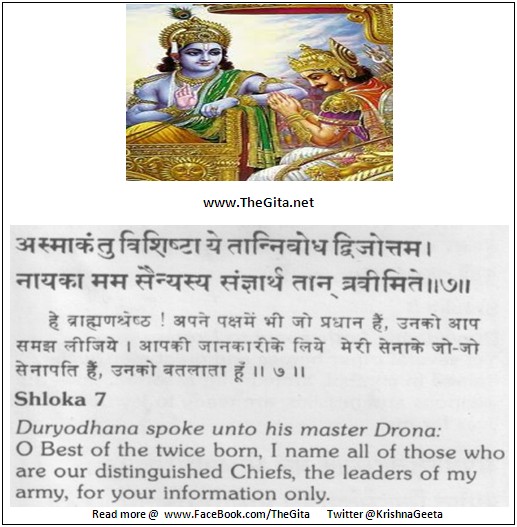
Duryodhana spoke unto his master Drona:
O Best of the twice born, I name all of those who are our distinguished Chiefs, the leaders of my army, of your information only.
हे ब्राह्मणश्रेष्ठ ! अपने पक्ष में भी जो प्रधान हैं, उनको आप समझ लीजिये । आपकी जानकारी के लिये मेरी सेना के जो-जो सेनापति हैं, उनको बतलाता हूँ ।। ७ ।।
Chapter – 1 – Shloka – 8
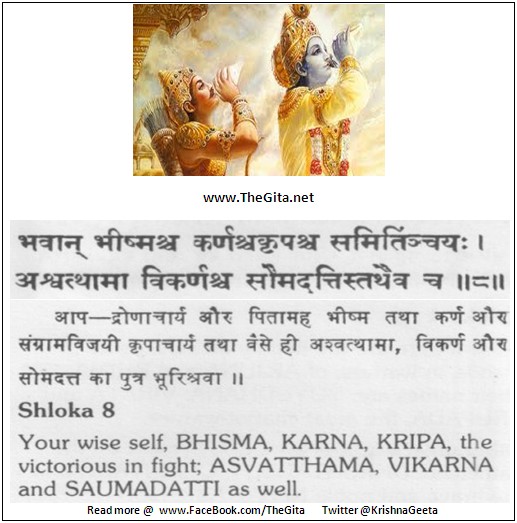
Your wise self, BHISMA, KARNA, KRIPA, the victorious in fight; ASVATTHAMA, VIKARNA and SAUMADATTI as well.
आप —– द्रोणाचार्य और पितामह भीष्म तथा कर्ण और संग्रामविजयी कृपाचार्य तथा वैसे ही अश्वत्थामा, विकर्ण और सोमदत्त का पुत्र भूरिश्रवा ।। ८ ।।
Chapter – 1 – Shloka – 9
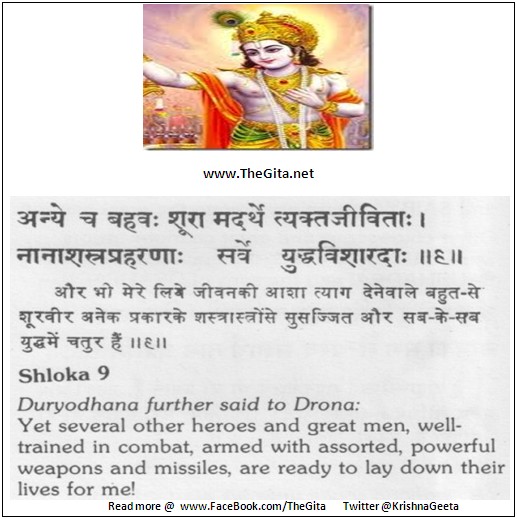
Duryodhana further said to Drona:
Yet several other heroes and great men, well-trained in combat, armed with assorted powerful weapons and missiles, are ready to lay down their lives for me!
और भी मेरे लिये जीवन की आशा त्याग देने वाले बहुत से शूरवीर अनेक प्रकार के शस्त्रास्त्रों से सुसज्जित और सब-के-सब युद्ध में चतुर हैं ।। ९ ।।
Chapter – 1 – Shloka – 10
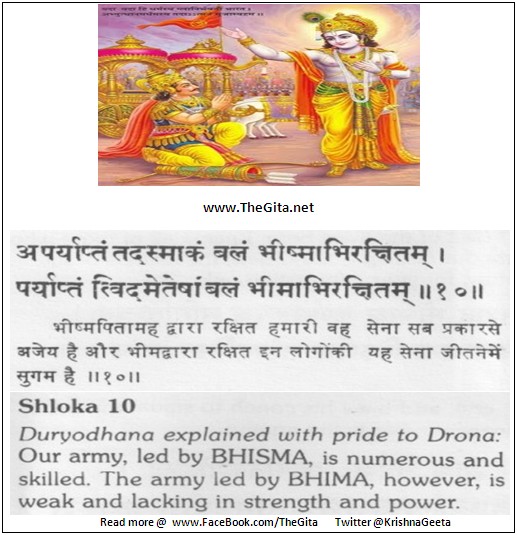
Duryodhana explained with pride to Drona:
Our army, led by BHISMA, is numerous and skilled. The army led by BHIMA, however, is weak and lacking in strength and power.
भीष्मपितामह द्वारा रक्षित हमारी वह सेना सब प्रकार से अजेय है और भीमद्वारा रक्षित इन लोगों की यह सेना जीतने में सुगम है ।। १० ।।
Chapter – 1 – Shloka – 11
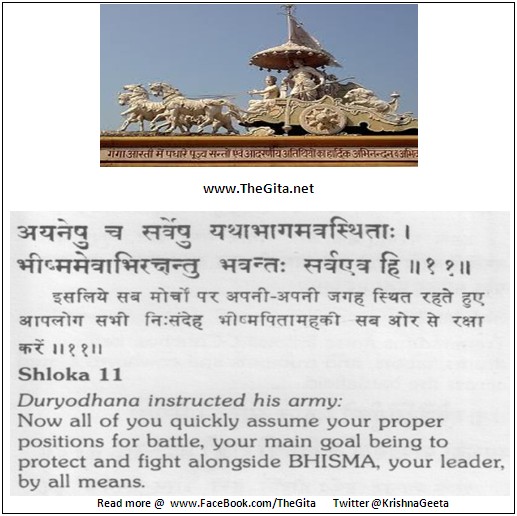
Duryodhana instructed his army:
Now all of you quickly assume your proper positions for battle, your main goal being to protect and fight alongside BHISMA, your leader, by all means.
इसलिये सब मोर्चों पर अपनी-अपनी जगह स्थित रहते हुए आप लोग सभी नि:संदेह भीष्मपितामह की सब और से रक्षा करें ।। ११ ।।
Chapter – 1 – Shloka – 12
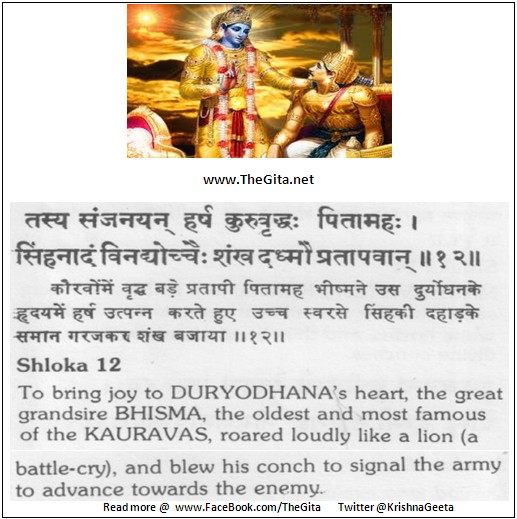
To bring joy to DURYODHANA’s heart, the great grandsire BHISMA, the oldest and most famous of the KAURAVAS, roared loudly like a lion (a battle-cry), and blew his conch to signal the army to advance towards the enemy.
कोरवों में वृद्ब बड़े प्रतापी पितामह भीष्म ने उस दुर्योधन के ह्रदय में हर्ष उत्पन्न करते हुए उच्च स्वर से सिंह की दहाड़ के समान गरजकर शंख बजाया ।। १२ ।।
Chapter – 1 – Shloka – 13
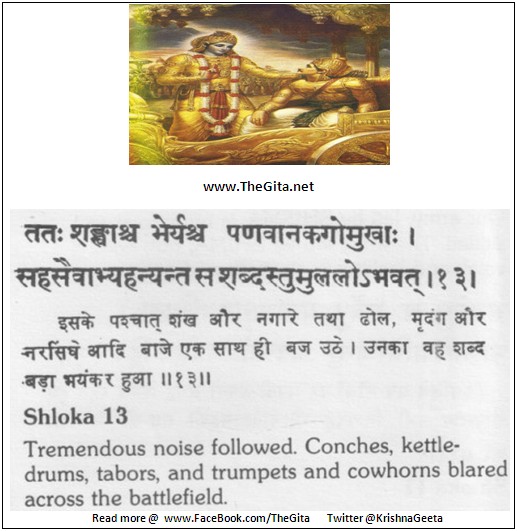
Tremendous noise followed. Conches, kettle-drums, tabors, and trumpets and cowhorns blared across the battlefield.
इसके पश्चात् शंख और नगारे तथा ढोल, मृदंग और नरसिंघे आदि बाजे एक साथ ही बज उठे । उनका वह शब्द बड़ा भयंकर हुआ ।। १३ ।।
Chapter – 1 – Shloka – 14
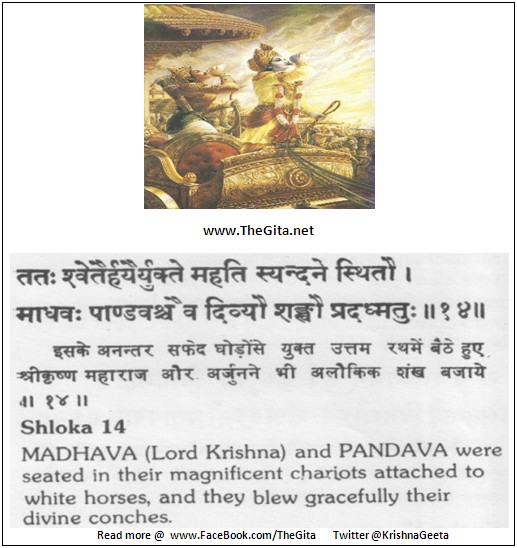
MADHAVA (Lord Krishna) and PANDAVA were seated in their magnificent chariote attached to white horses and they blew gracefully their divine conches.
इसके अनन्तर सफेद घोडों से युक्त्त उत्तम रथ में बैठे हुए श्रीकृष्ण महाराज और अर्जुन ने भी अलौकिक शंख बजाये ।। १४ ।।
Chapter – 1 – Shloka – 15
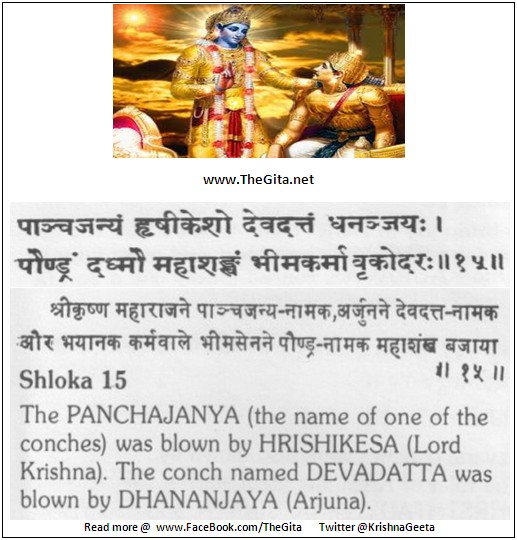
The PANCHAJANYA (the name of one of the conches) was blown by HRISHIKESA (Lord Krishna). The conch named DEVADATTA was blown by DHANANJAYA (Arjuna).
श्रीकृष्ण महाराज ने पाञ्चजन्य-नामक, अर्जुन ने देवदत्त-नामक और भयानक कर्मवाले भीमसेन ने पौण्ड्र-नामक महाशंख बजाया ।। १५ ।।
Chapter – 1 – Shloka – 16
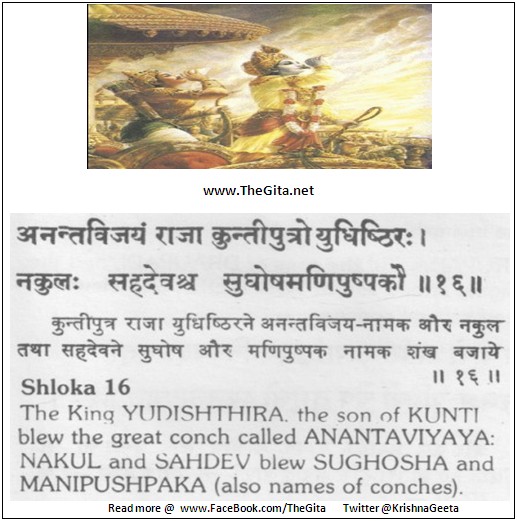
The King YUDISHTHIRA. the son of KUNTI blew the great conch called ANANTAVIYAYA: NAKUL and SAHDEV blew SUGHOSHA and MANIPUSHPAKA (also names of conches).
कुन्तीपुत्र राजा युधिष्ठिर ने अनन्तविजय-नामक और नकुल तथा सहदेव ने सुघोष और मणिपुष्पक नामक शंख बजाये ।। १६ ।।
Chapter – 1 – Shloka – 17,18
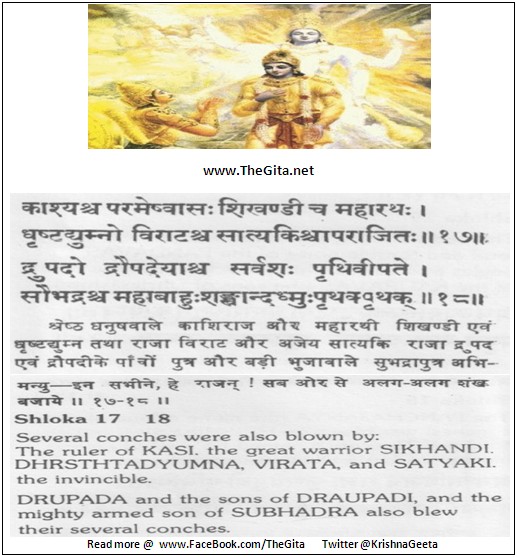
Several conches were also blown by:
The ruler of KASI. the great warrior SIKHANDI, DHRSTHTADYUMNA, VIRATA, and SATYAKI, the invincible.
DRUPADA and the sons of DRAUPADI, and the mighty armed son of SUBHADRA also blew their several conches.
श्रेष्ठ धनुषवाले काशिराज और महारथी शिखण्डी एवं धृष्टधुम्न तथा राजा विराट और अजेय सात्यकि राजा द्रु पद एवं द्रौपदी के पाँचो पुत्र और बड़ी भुजावाले सुभद्रापुत्र अभिमन्यु —- इन सभी ने, हे राजन् ! सब ओर से अलग-अलग शंख बजाये ।। १७ – १८ ।।
Chapter – 1 – Shloka – 19
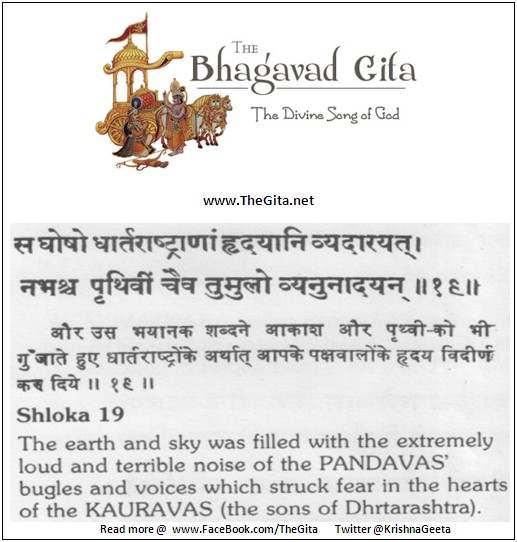
The earth and sky was filled with the extremely loud and terrible noise of the PANDAVAS’ bugles and voices which struck fear in the hearts of the KAURAVAS (the sons of Dhrtarashtra).
और उस भयानक शब्द ने आकाश और पृथ्वी-को भी गुँजाते हुए धार्तराष्ट्रों के अर्थात् आपके पक्षवालों के ह्रदय विदीर्ण कर दिये ।। १९ ।।
Chapter – 1 – Shloka – 20,21
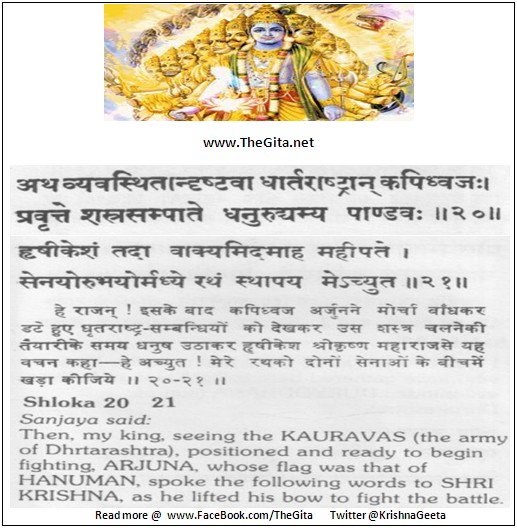
Sanjaya said:
Then, my king, seeing the KAURAVAS (the army of Dhrtarashtra), positioned and ready to begin fighting, ARJUNA, whose flag was that of HANUMAN, spoke the following words to SHRI KRISHNA, as he lifted his bow to fight the battle.
हे राजन् ! इसके बाद कपिध्वज अर्जुन ने मोर्चा बाँधकर डटे हुए धृतराष्ट्र-सम्बन्धियों को देखकर उस शस्त्र चलने की तैयारी के समय धनुष उठाकर ह्रषीकेश श्रीकृष्ण महाराज से यह वचन कहा —— हे अच्युत ! मेरे रथको दोनों सेनाओं के बीच में खड़ा कीजिये ।। २० – २१ ।।
Chapter – 1 – Shloka – 22
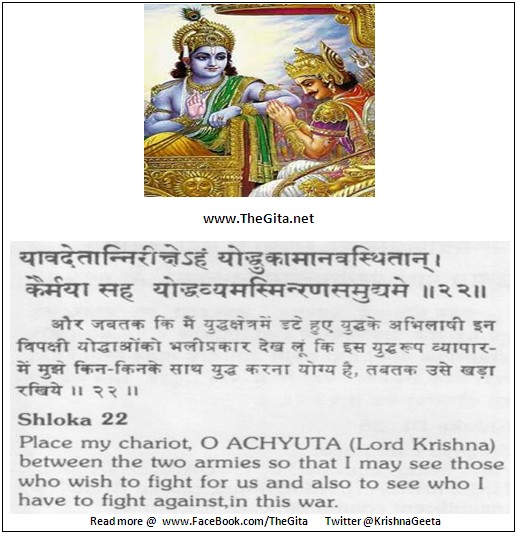
Place my chariot, O ACHYUTA (Lord Krishna) between the two armies so that I may see those who wish to fight for us and also to see who I have to fight against, in this war.
और जब तक की मैं युद्धक्षेत्र में डटे हुए युद्ध के अभिलाषी इन विपक्षी योद्धाओं को भली प्रकार देख लू कि इस युद्ध रूप व्यापार में मुझे किन-किनके साथ युद्ध करना योग्य है, तब तक उसे खड़ा रखिये ।। २२ ।।
Chapter – 1 – Shloka – 23
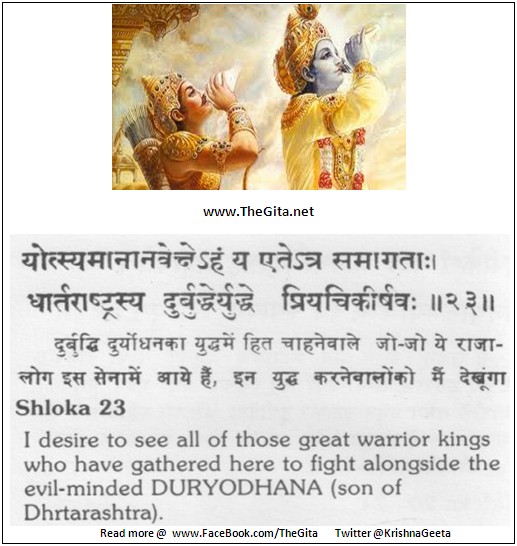
I desire to see all of those great warrior kings who have gathered here to fight alongside the evil-minded DURYODHANA (son of Dhrtarashtra).
दुर्बुद्भि दुर्योधन का युद्ध में हित चाहनेवाले जो-जो ये राजा लोग इस सेना में आये हैं, इन युद्ध करनेवालों कों मैं देखूंगा ।। २३ ।।
Chapter – 1 – Shloka – 24,25
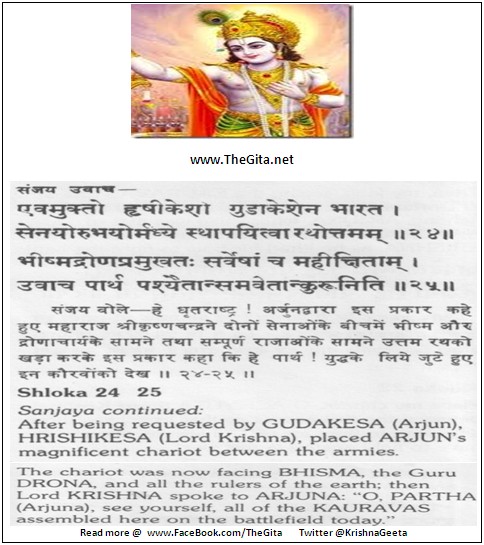
Sanjaya continued:
After being requested by GUDAKESA (Arjun), HRISHIKESA (Lord Krishna), placed ARJUN’s magnificent chariot between the armies.
The chariot was now facing BHISMA, the Guru DRONA, and all the rulers of the earth; then Lord KRISHNA spoke to ARJUNA: “O, PARTHA (Arjuna), see yourself all of the KAURAVAS assembled here on the battlefield today.”
संजय बोले —– हे धृतराष्ट्र ! अर्जुन द्वारा इस प्रकार कहे हुए महाराज श्रीकृष्णचन्द्र ने दोनों सेनाओं के बीच में भीष्म और द्रोणाचार्य के सामने तथा सम्पूर्ण राजाओं के सामने उत्तम रथ को खड़ा कर के इस प्रकार कहा की हे पार्थ ! युद्ध के लिये जुटे हुए इन कौरवों को देख ।। २४ – २५ ।।
Chapter – 1 – Shloka – 26, 27
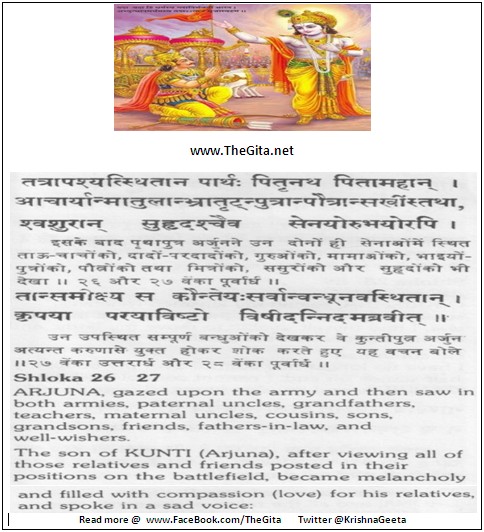
ARJUNA, gazed upon the army and then saw in both armies, paternal uncles, grandfathers, teachers, maternal uncles, cousins, sons, grandsons, friends, fathers-in-law, and well-wishers.
The son of KUNTI (Arjuna), after viewing all of those relatives and friends posted in their positions on the battlefield, became melancholy and filled with compassion (love) for his relatives, and spoke in a sad voice:
इसके बाद पृथापुत्र अर्जुन ने उन दोनों ही सेनाओं में स्थित ताऊ-चाचों को, दादों-परदादों को, गुरुओं को, मामाओं को, भाइयों-पुत्रों को, पौत्रों को तथा मित्रों को, ससुरों को और सुह्रदों को भी देखा उन उपस्थित सम्पूर्ण बन्धुओं को देखकर वे कुन्तीपुत्र अर्जुन अत्यन्त करुणा से युक्त्त होकर शोक करते हुए यह वचन बोले ।। २६ ।।
ARJUNA, gazed upon the army and then saw in both armies, paternal uncles, grandfathers, teachers, maternal uncles, cousins, sons, grandsons, friends, fathers-in-law, and well-wishers.
The son of KUNTI (Arjuna), after viewing all of those relatives and friends posted in their positions on the battlefield, became melancholy and filled with compassion (love) for his relatives, and spoke in a sad voice:
इसके बाद पृथापुत्र अर्जुन ने उन दोनों ही सेनाओं में स्थित ताऊ-चाचों को, दादों-परदादों को, गुरुओं को, मामाओं को, भाइयों-पुत्रों को, पौत्रों को तथा मित्रों को, ससुरों को और सुह्रदों को भी देखा उन उपस्थित सम्पूर्ण बन्धुओं को देखकर वे कुन्तीपुत्र अर्जुन अत्यन्त करुणा से युक्त्त होकर शोक करते हुए यह वचन बोले ।। २७ ।।
Chapter – 1 – Shloka – 28,29
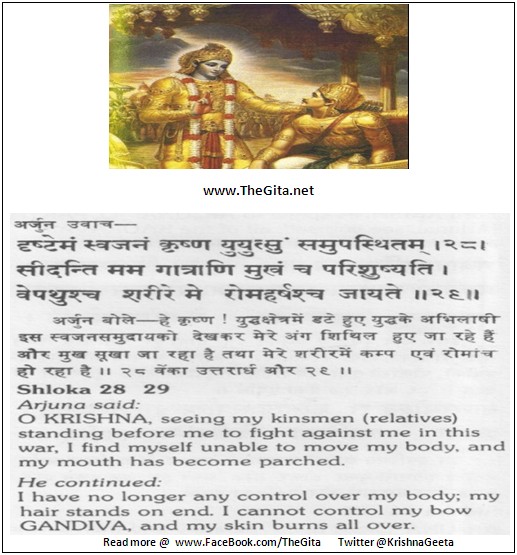
Arjuna said:
O KRISHNA, seeing my kinsmen (relatives) standing before me to fight against me in this war, I find myself unable to move my body, and my mouth has become parched.
He continued:
I have no longer any control over my body; my hair stands on end. I cannot control my bow GANDIVA, and my skin burns all over.
अर्जुन बोले —– हे कृष्ण ! युद्ध क्षेत्र में डटे हुए युद्ध के अभिलाषी इस स्वजनसमुदाय को देखकर मेरे अंग शिथिल हुए जा रहे हैं और मुख सूखा जा रहा है तथा मेरे शरीर में कम्प एवं रोमांच हो रहा है ।। २८ – २९ ।।
Chapter – 1 – Shloka – 30
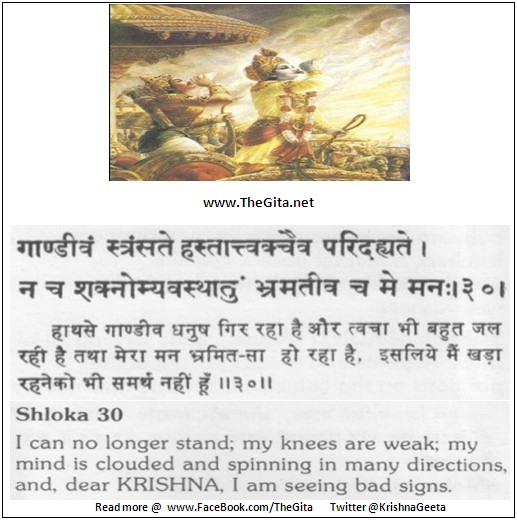
Shloka 30
I can no longer stand; my knees are weak; my mind is clouded and spinning in many directions, and, dear KRISHNA, I am seeing bad signs.
हाथ से गाण्डीव धनुष गिर रहा है और त्वचा भी बहुत जल रही है तथा मेरा मन भ्रमित-सा हो रहा है, इसलिये मै खड़ा रहने को भी समर्थ नहीं हूँ ।। ३० ।।
Chapter – 1 – Shloka – 31
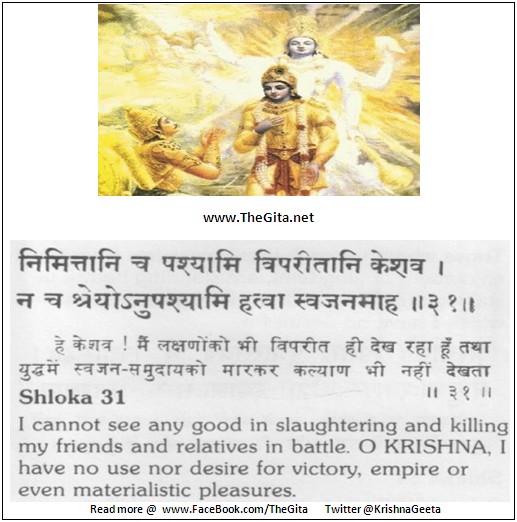
I cannot see any good in slaughtering and killing my friends and relatives in battle. O KRISHNA, I have no use nor desire for victory, empire or even materialistic pleasures.
हे केशव ! मैं लक्षणों को भी विपरीत ही देख रहा हूँ तथा युद्ध में स्वजन-समुदाय को मारकर कल्याण भी नहीं देखता ।। ३१ ।।
Chapter – 1 – Shloka – 32
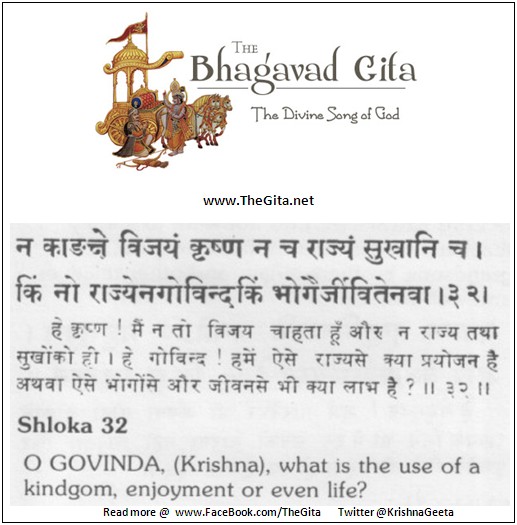
O GOVINDA, (Krishna), what in the use of a kindgom, enjoyment or even life?
हे कृष्ण ! मैं न तो विजय चाहता हूँ और न राज्य तथा सुखों को ही । हे गोविन्द ! हमें ऐसे राज्य से क्या प्रयोजन है अथवा ऐसे भोगों से और जीवन से भी क्या लाभ है ? ।। ३२ ।।
Chapter – 1 – Shloka – 33
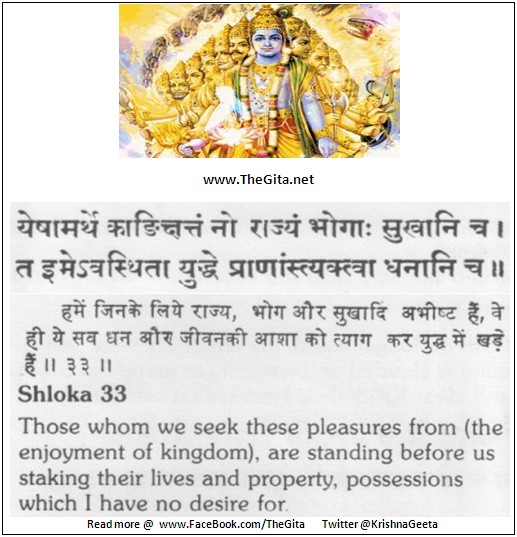
Those whom we seek these pleasures from (the enjoyment of kingdom), are standing before us staking their lives and property, possessions which I have no desire for.
हमें जिनके लिये राज्य, भोग और सुखादिं अभीष्ट हैं, वे ही ये सब धन और जीवन की आशा को त्याग कर युद्ध में खड़े हैं ।। ३३ ।।
Chapter – 1 – Shloka – 34
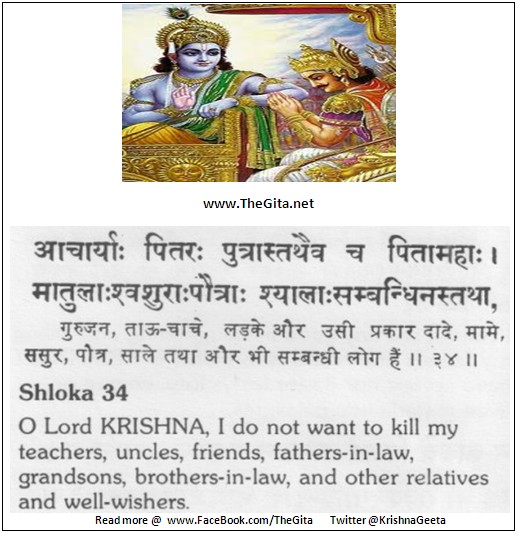
O Lord KRISHNA, I do not want to kill my teachers, uncles, friends, fathers-in-law, grandsons, brothers-in-law, and other relatives and well-wishers.
गुरुजन, ताऊ-चाचे, लड़के और उसी प्रकार दादे, मामे, ससुर, पौत्र, साले तथा और भी सम्बन्धी लोग हैं ।। ३४ ।।
Chapter – 1 – Shloka – 35
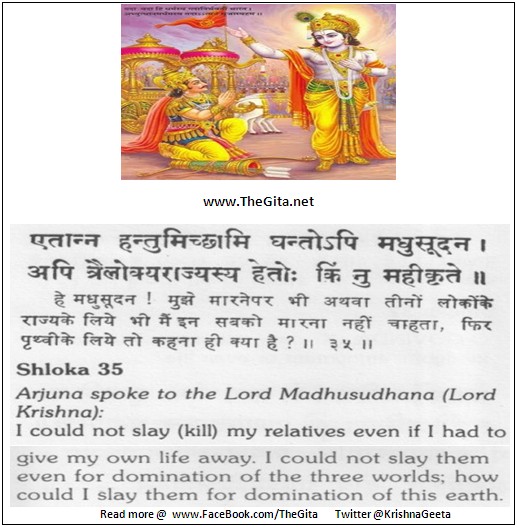
Arjuna spoke to the Lord Madhusudhana (Lord Krishna):
I could not slay (kill) my relatives even if I had to give my own life away. I could not slay them even for domination of the three worlds; how could I slay them for domination of this earth.
हे मधुसूदन ! मुझे मारने पर भी अथवा तीनों लोकों के राज्य के लिये भी मैं इन सबको मारना नहीं चाहता, फिर पृथ्वी के लिये तो कहना ही क्या है ? ।। ३५ ।।
Chapter – 1 – Shloka – 36
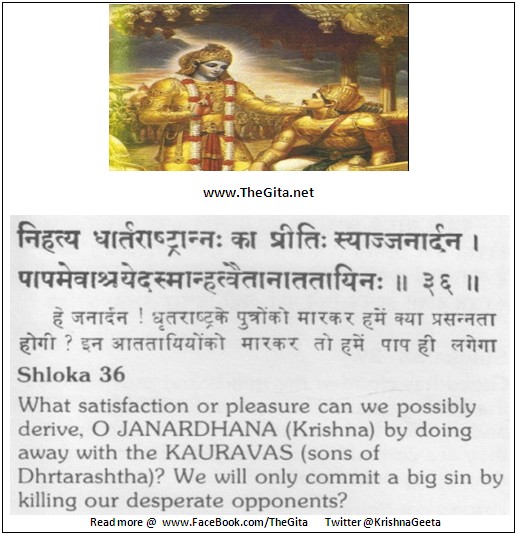
What satisfaction or pleasure can we possibly derive, O JANARDHANA (Krishna) by doing away with the KAURAVAS (sons of Dhrtarashtha)? We will only commit a big sin by killing our desperate opponents?
हे जनार्दन ! धृतराष्ट्र के पुत्रों को मारकर हमें क्या प्रसन्नता होगी ? इन आततायियों को मारकर तो हमें पाप ही लगेगा ।। ३६ ।।
Chapter – 1 – Shloka – 37
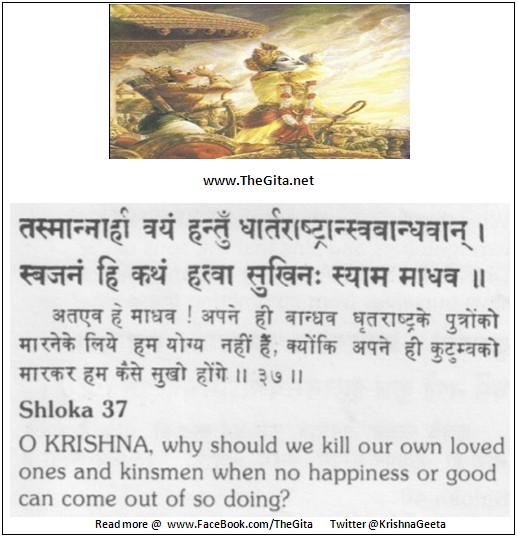
O KRISHNA, why should we kill our own loved ones and kinsmen when no happiness or good can come out of so doing?
अतएव हे माधव ! अपने ही बान्धव धृतराष्ट्र के पुत्रों को मारने के लिये हम योग्य नहीं हैं ; क्योंकि अपने ही कुटुम्ब को मारकर हम कैसे सुखी होंगे ।। ३७ ।।
Chapter – 1 – Shloka – 38,39
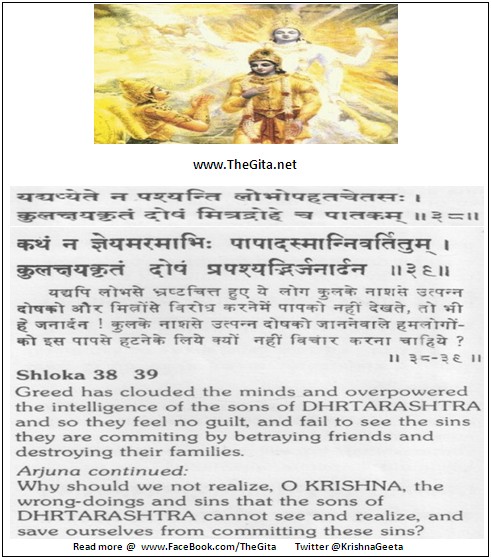
Greed has clouded the minds and overpowered the intelligence of the sons of DHRTARASHTRA and so they feel no guilt, and fail to see the sins they are commiting by betraying friends and destroying their families.
Arjuna continued:
Why should we not realize, O KRISHNA, the wrong-doings and sins that the sons of DHRTARASATRA cannot see and realize, and save ourselves from committing these sins?
यधपि लोभ से भ्रष्टचित्त हुए ये लोग से कुल के नाश से उत्पन्न दोष को और मित्रों से विरोध करने में पाप को नहीं देखते, तो भी हे जनार्दन ! कुल के नाश से उत्पन्न दोष को जानने वाले हम लोगों को इस पाप से हटने के लिये क्यों नहीं विचार करना चाहिये ? ।। ३८ – ३९ ।।
Chapter – 1 – Shloka – 40
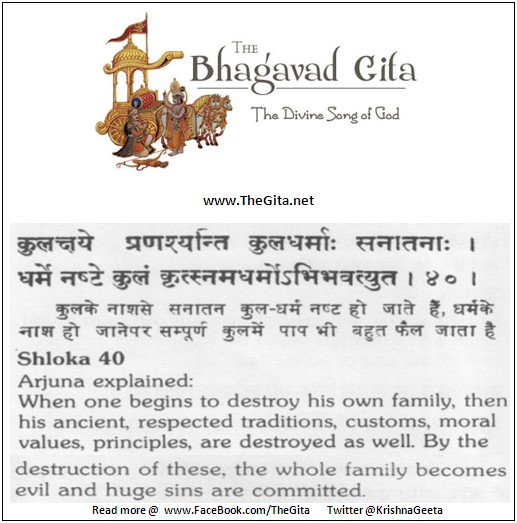
Arjuna explained:
When one begins to destroy his own family, then his ancient, respected traditions, customs, moral values, principles, are destroyed as well. By the destruction of these, the whole family becomes evil and huge sins are committed.
कुल के नाश से सनातन कुल-धर्म नष्ट हो जाते हैं, धर्म के नाश हो जाने पर सम्पूर्ण कुल में पाप भी बहुत फैल जाता है ।। ४० ।।
Chapter – 1 – Shloka – 41
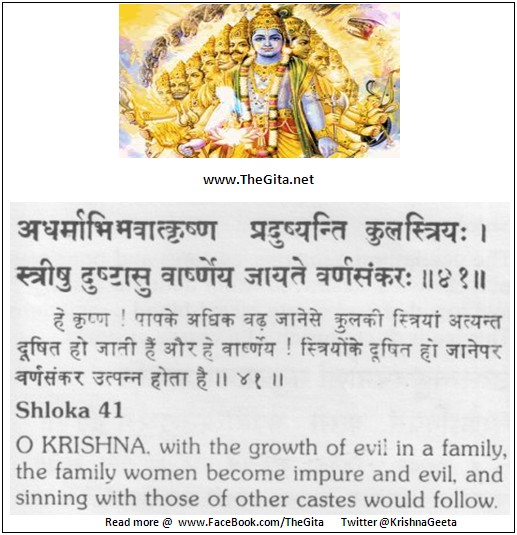
O KRISHNA, with the growth of evil in a family, the family women, become impure and evil, and sinning with those of other castes would follow.
हे कृष्ण ! पाप के अधिक बढ़ जाने से कुल की स्त्रियां अत्यन्त दूषित हो जाती हैं और हे वार्ष्णेय ! स्त्रियों के दूषित हो जाने पर वर्णसंकर उत्पन्न होता है ।। ४१ ।।
Chapter – 1 – Shloka – 42
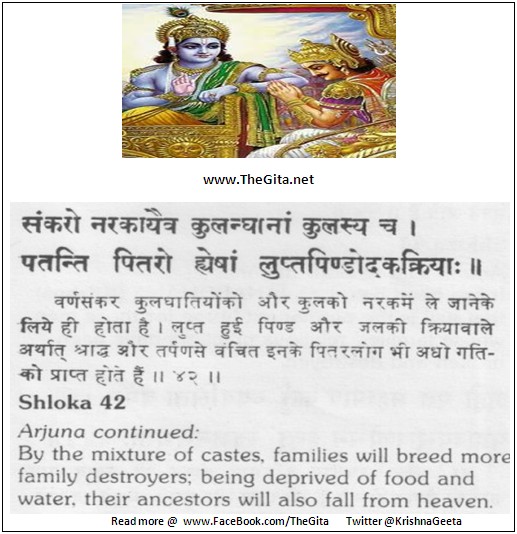
Arjuna continued;
By the mixture of castes, families will breed more family destroyers; being deprived of food and water, their ancestors will also fall from heaven.
वर्णसंकर कुलघातियों को और कुल को नरक में ले जाने के लिये ही होता है । लुप्त हुई पिण्ड और जलकी क्रिया वाले अर्थात् श्राद्ब और तर्पण से वंचित इनके पितरलोग भी अधो गति को प्राप्त होते हैं ।। ४२ ।।
Chapter – 1 – Shloka – 43
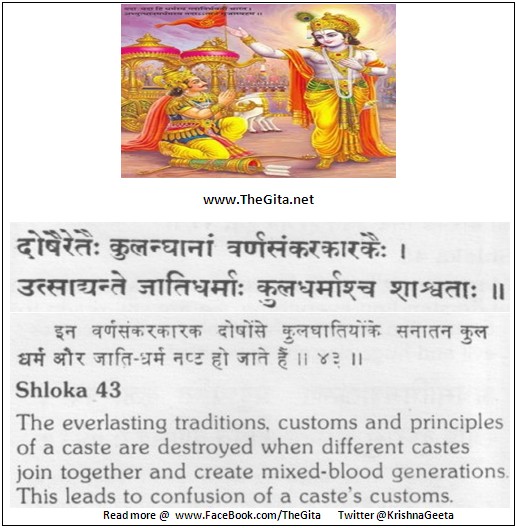
The everlasting traditions, customs and principles of a caste are destroyed when different castes join together and create mixed-blood generations. This leads to confusion of a caste’s customs.
इन वर्णसंकरकारक दोषों से कुलघातियों के सनातन कुल धर्म और जाती-धर्म नष्ट हो जाते हैं ।। ४३ ।।
Chapter – 1 – Shloka – 44
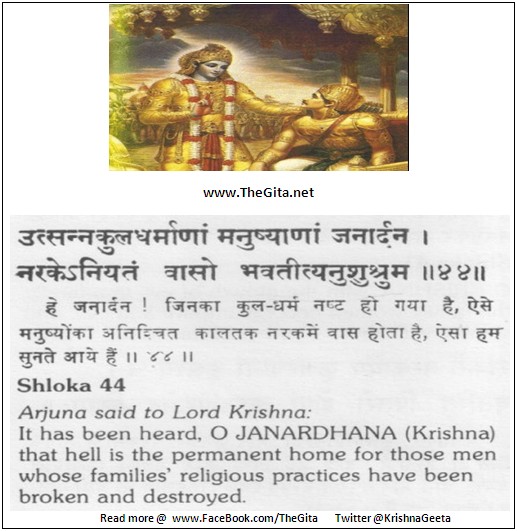
Arjuna said to Lord Krishna:
It has been heard, O JANARDHANA (Krishna) that hell is the permanent home for those men whose families’ religious practices have been broken and destroyed.
हे जनार्दन ! जिनका कुल-धर्म नष्ट हो गया है, ऐसे मनुष्यों का अनिश्चित काल तक नरक में वास होता है, ऐसा हम सुनते आये हैं ।। ४४ ।।
Chapter – 1 – Shloka – 45
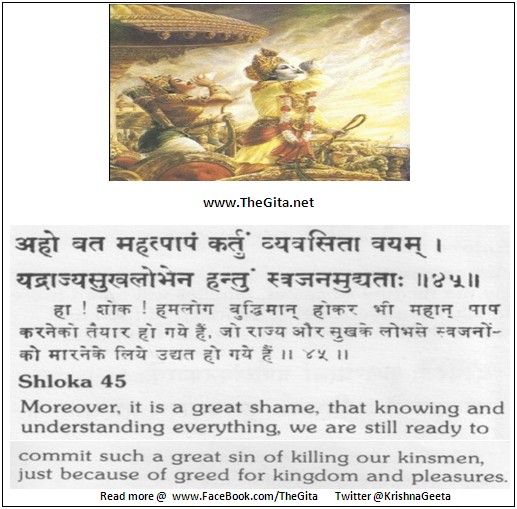
Moreover, it is a great shame, that knowing and understanding everything, we are still ready to commit such a great sin of killing our kinsmen, just because of greed for kingdom and pleasures.
हा ! शोक ! हमलोग बुद्भिमान् होकर भी महान् पाप करने को तैयार हो गये हैं, जो राज्य और सुख के लोभ से स्वजनों को मारने के लिये उधत हो गये हैं ।। ४५ ।।
Chapter – 1 – Shloka – 46
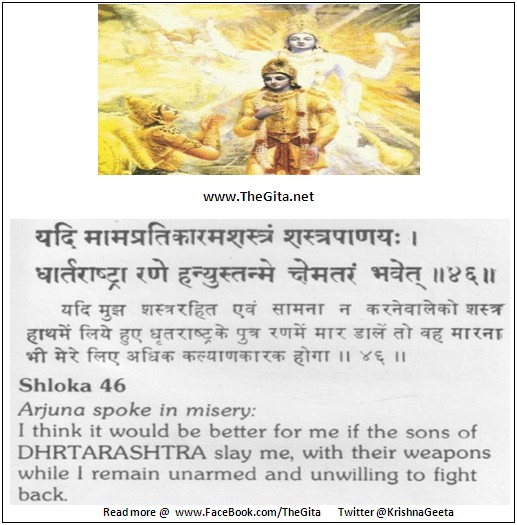
Arjuna spoke in misery:
I think it would be better for me if the sons of DHRTARASHTRA slay me, with their weapons while I remain unarmed and unwilling to fight back.
यदि मुझ शस्त्ररहित एवं सामना न करने वाले को शस्त्र हाथ में लिये हुए धृतराष्ट्र के पुत्र रण में मार डालें तो वह मारना भी मेरे लिए अधिक कल्याणकारक होगा ।। ४६ ।।
Chapter – 1 – Shloka – 47
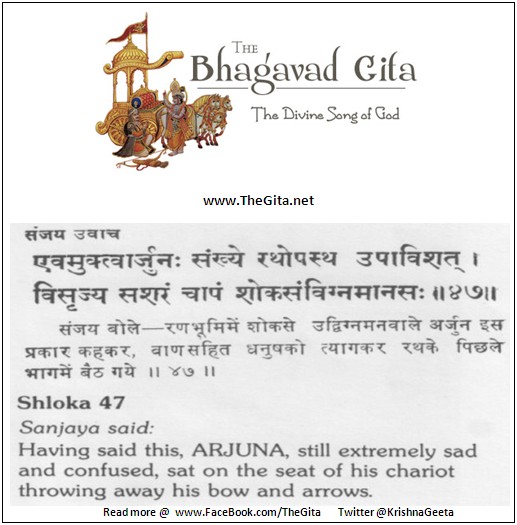
Sanjaya said:
Having said this, ARJUNA, still extremely sad and confused sat on the seat of this chariot throwing away his bow and arrows.
संजय बोले —- रणभूमि में शोकसे उद्भिग्नमन वाले अर्जुन इस प्रकार कहकर, बाण सहित धनुष को त्याग कर रथ के पिछले भाग में बैठ गये ।। ४७ ।।
Chapter 1|| Chapter 2 || Chapter 3 || Chapter 4|| Chapter 5 || Chapter 6 || Chapter 7 || Chapter 8 || Chapter 9 || Chapter 10 || Chapter 11 || Chapter 12 || Chapter 13 || Chapter 14 || Chapter 15 || Chapter 16 || Chapter 17 || Chapter 18 ||
Pingback: Chapter – 2 | The Gita - Shree Krishna Bhagwad Geeta
Pingback: Chapter – 6 | The Gita - Shree Krishna Bhagwad Geeta
Pingback: Chapter – 7 | The Gita - Shree Krishna Bhagwad Geeta
Pingback: Chapter – 9 | The Gita - Shree Krishna Bhagwad Geeta
Pingback: Chapter – 10 | The Gita - Shree Krishna Bhagwad Geeta
Pingback: Chapter – 11 | The Gita - Shree Krishna Bhagwad Geeta
Pingback: Chapter – 12 | The Gita - Shree Krishna Bhagwad Geeta
Pingback: Chapter – 13 | The Gita - Shree Krishna Bhagwad Geeta
Pingback: Chapter – 15 | The Gita - Shree Krishna Bhagwad Geeta
Pingback: Chapter – 16 | The Gita - Shree Krishna Bhagwad Geeta
Pingback: Chapter – 17 | The Gita - Shree Krishna Bhagwad Geeta
Pingback: Chapter – 18 | The Gita - Shree Krishna Bhagwad Geeta
Pingback: Chapter – 5 | The Gita - Shree Krishna Bhagwad Geeta
Pingback: Chapter – 8 | The Gita - Shree Krishna Bhagwad Geeta
Pingback: Chapter – 3 | The Gita - Shree Krishna Bhagwad Geeta